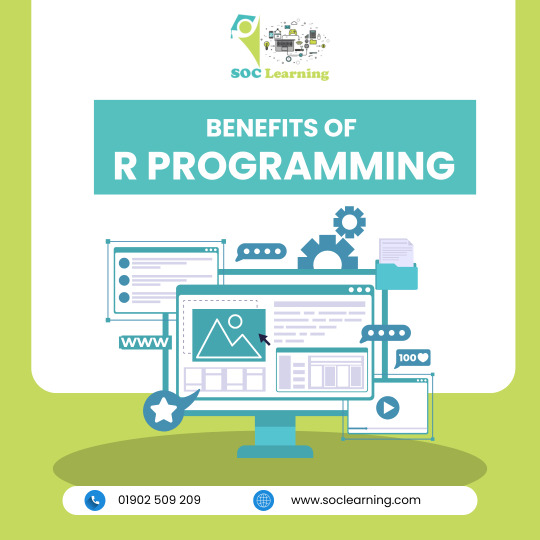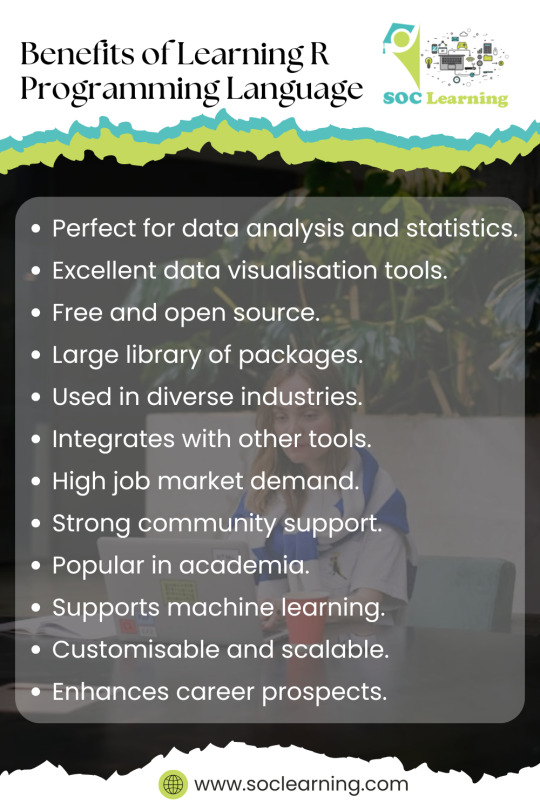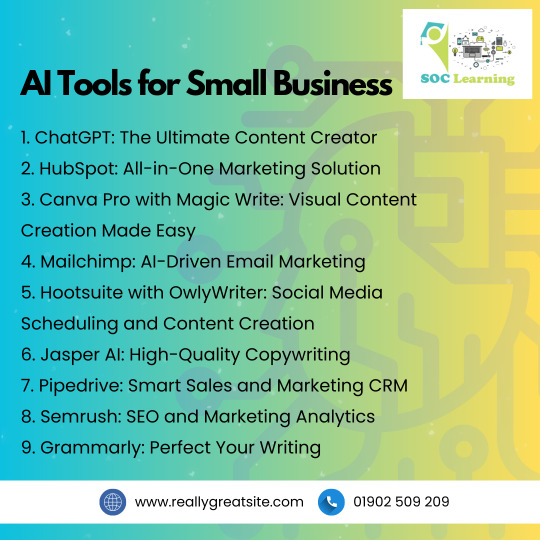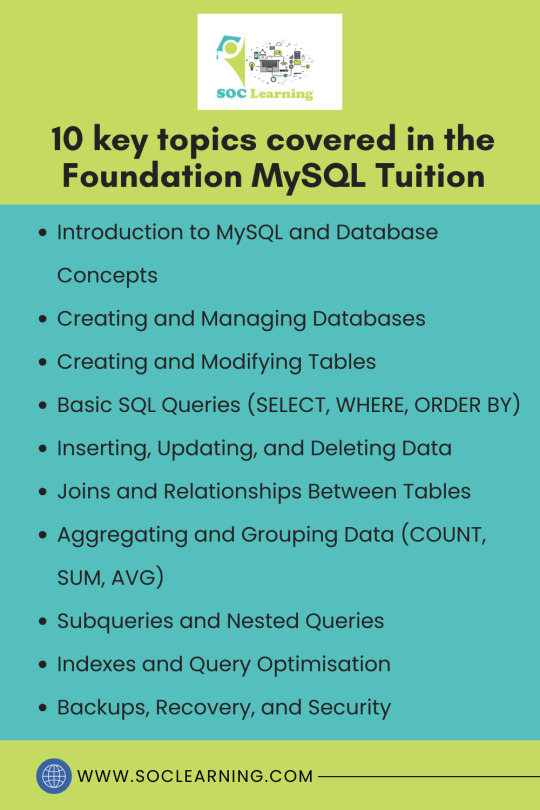Unlock your child's potential with SOC Learning! Offering expert coding tution and tailored tuition for UK students, designed to inspire and achieve academic success.
Don't wanna be here? Send us removal request.
Text

Unlock endless opportunities with JavaScript! 💻 Start your coding journey today with SOC Learning. 🌟 Read our Full Article here : https://soclearning.com/latest-blogs/12-compelling-reasons-to-learn-javascript-programming-today/
0 notes
Text

Unlock your future with Python! Join our Python course today: https://soclearning.com/tuition/python-tuition/
0 notes
Text
The Benefits of Learning R Programming

R programming has become an essential skill for those interested in data science, statistics, and machine learning. Whether you're a student, a professional looking to upskill, or simply someone fascinated by data analysis, learning R can open up numerous opportunities. Here are some key benefits of mastering R programming.
1. Specialised for Data Analysis
R was designed specifically for data analysis, making it a powerful tool for handling and interpreting large datasets. It is widely used for statistical computing and graphics, making it ideal for tasks such as data manipulation, statistical testing, and data visualisation.
2. Excellent for Statistical Analysis
One of R's most significant advantages is its extensive library of statistical functions. With R, users can easily conduct complex analyses, such as regression models, hypothesis testing, and time-series analysis. This makes it the go-to language for statisticians and data scientists alike.
3. Comprehensive Visualisation Tools
R is renowned for its ability to create high-quality data visualisations. With libraries like ggplot2, you can create intricate, customisable charts, graphs, and interactive plots to represent your data. Visualising data is a crucial step in making data-driven decisions, and R makes this process both easy and effective.
4. Large and Active Community
R has a vast, supportive community of users, including statisticians, data scientists, and developers. Whether you're facing a problem or looking for tutorials, you can always find resources to help you learn and solve any issue. The active development of packages by the community ensures that R remains up-to-date and relevant in the ever-evolving field of data analysis.
5. Integration with Other Languages
R can be integrated with other programming languages like Python, C++, and SQL. This makes it versatile for handling diverse data processing tasks. It also means that you can use R alongside other tools and languages to enhance your data analysis workflow.
6. Ideal for Machine Learning
R is not just for statistical analysis; it also supports machine learning. With libraries like caret, randomForest, and xgboost, R enables you to build predictive models and engage in advanced machine learning tasks. It is a great choice for anyone looking to dive into the world of AI and machine learning.
7. Free and Open Source
R is open-source software, meaning it is completely free to use. This makes it accessible for everyone, from students to professionals, and ensures that learning R doesn’t come with any financial burden. Its open-source nature also encourages collaborative development, leading to continuous improvements.
8. Widely Used in Academia and Industry
R is not only popular in academia but is also widely used in industries like healthcare, finance, marketing, and government. Companies looking to leverage data-driven decision-making often turn to R due to its capabilities in analysis and visualisation.
9. Boosts Career Opportunities
Given the rise of data science and analytics roles, R programming is an in-demand skill that can significantly boost your career prospects. From research roles to data scientist positions, R is highly valued in various job markets. Learning R gives you a competitive edge and allows you to take on more specialised tasks in data science and analytics.
Why Choose SOC Learning?
At SOC Learning, we offer tailored tuition that can help you master R programming efficiently. Our expert instructors provide personalised learning experiences, guiding you through the complexities of the language. Whether you're a beginner or looking to advance your skills, our comprehensive course covers everything from the basics to more advanced techniques, ensuring you have the knowledge to apply R in real-world scenarios.
We offer flexible online and offline options, making it easy to learn at your own pace. Plus, our practical approach to teaching means you’ll work on real data projects, building hands-on experience that will help you stand out in the job market.
Conclusion
Learning R programming is an excellent way to enhance your data analysis and statistical skills. Its powerful libraries, visualisation tools, and open-source nature make it an invaluable tool for anyone working with data. Whether you're aiming for a career in data science, research, or machine learning, R is a programming language you’ll want to add to your skill set.
For more information about learning R programming, visit R Programming Language Tuition.
0 notes
Text
Visit or Website to know our Courses Offered - https://soclearning.com/
0 notes
Text
Understanding MySQL: Why It's So Popular and Its Core Features

What is MySQL?
MySQL is an open-source relational database management system (RDBMS) that is widely used for managing and storing data. It uses Structured Query Language (SQL) to create, manage, and query databases. MySQL is one of the most popular database systems worldwide due to its ease of use, reliability, and robust performance. It is commonly used in web applications, especially in conjunction with PHP, and powers some of the largest websites and applications on the internet, including Facebook, Twitter, and YouTube.
Why is MySQL So Popular?
There are several reasons why MySQL has gained immense popularity among developers, businesses, and organisations alike:
Open Source and Free: MySQL is open-source, meaning it is free to use and can be modified to suit specific needs. This makes it an attractive option for both small businesses and large enterprises.
Reliability and Stability: MySQL is known for its stability and robustness, making it a reliable choice for applications that require high availability and minimal downtime.
Speed and Efficiency: MySQL offers high-speed data retrieval and processing, which is essential for modern applications that need to handle large volumes of data quickly and efficiently.
Scalability: MySQL can handle large datasets, which allows it to scale seamlessly as an application grows. This scalability makes it suitable for both small websites and large-scale enterprise applications.
Cross-Platform Support: MySQL can run on various platforms, including Windows, Linux, macOS, and others, making it versatile and adaptable to different environments.
Active Community and Support: Being an open-source platform, MySQL benefits from a large, active community that contributes to its development, support, and troubleshooting.
Core Features of MySQL
MySQL comes with a variety of features that make it a powerful and efficient database management system:
Data Security: MySQL provides robust security features, including data encryption and user access controls, to ensure that only authorised users can access sensitive information.
Multi-User Access: MySQL allows multiple users to access and manipulate the database simultaneously, without interfering with each other’s work. This is essential for collaborative environments.
Backup and Recovery: MySQL offers various backup and recovery options, ensuring that data is protected against loss or corruption. Tools such as MySQL Enterprise Backup allow for fast and reliable backups.
Replication: MySQL supports data replication, which allows for data to be copied across multiple servers, ensuring high availability and load balancing. This feature is crucial for large-scale applications that require constant uptime.
Indexes: MySQL supports the use of indexes to improve query performance. Indexes speed up data retrieval operations, making it easier for developers to work with large datasets.
ACID Compliance: MySQL supports ACID (Atomicity, Consistency, Isolation, Durability) properties, which ensures that database transactions are processed reliably.
Full-Text Search: MySQL includes a full-text search engine, allowing developers to search and index text-based data more efficiently.
Stored Procedures and Triggers: MySQL allows the use of stored procedures and triggers to automate tasks and enforce business logic directly within the database.
Conclusion
MySQL is an essential tool for developers and businesses that require a reliable, fast, and secure database management system. Its open-source nature, combined with its powerful features, makes it an ideal choice for projects of all sizes. If you're just starting out with MySQL or looking to improve your knowledge of this versatile platform, check out our complete guide to MySQL to learn more.
0 notes
Text
10 Top GCSE Biology Revision Tips for Successful Studying

Revising for GCSE Biology can feel overwhelming with the sheer amount of content to cover, from cellular processes to ecosystems and genetics. With the right approach, however, you can transform your revision sessions into efficient, manageable, and even enjoyable experiences. Here are ten top tips to help you study smarter and ace your GCSE Biology exams.
1. Create a Detailed Revision Plan
Structure your study time: A clear revision plan helps you stay on track and ensures that you cover all the biology topics in time for the exam. Break down each topic and assign specific days for each, incorporating rest days to avoid burnout.
2. Focus on Understanding Concepts, Not Just Memorisation
Biology is all about connections: Instead of simply memorising definitions, focus on understanding how processes work. Grasping the ‘why’ behind concepts like photosynthesis or cellular respiration will make them easier to recall and apply in exam situations.
3. Use Diagrams and Drawings
Visual aids are essential: Many biology topics, such as cell structure, organ systems, and the process of mitosis, are easier to understand when viewed visually. Draw and label diagrams to reinforce your understanding, and refer back to them during revision.
4. Practice with Past Papers
Familiarise yourself with the exam format: Practising with past GCSE Biology papers helps you get used to the types of questions and how they’re phrased. Set a timer and simulate exam conditions to improve your time management and answer precision.
5. Utilise Flashcards for Key Terms
Master the terminology: Biology has a unique vocabulary. Create flashcards for terms like "osmosis," "mitochondria," and "homeostasis" to drill the vocabulary into memory. Quiz yourself or use an app to make the process more interactive.
6. Summarise with Mind Maps
See the big picture: Use mind maps to summarise topics like the nervous system or biodiversity. Mapping out information helps you understand how topics are interconnected, making it easier to retain complex information and see how concepts relate.
7. Teach the Material to Someone Else
Test your knowledge: Teaching topics to friends or family members is one of the most effective ways to consolidate information. Explaining complex ideas in your own words will deepen your understanding and highlight areas you may need to review.
8. Explore Online Resources and Videos
Supplement your notes: Many free online resources cover GCSE Biology topics in video format, which can simplify difficult concepts. Try using interactive quizzes and animations to engage with the content in a dynamic way.
9. Regularly Quiz Yourself
Spot-check your knowledge: Quizzes are an excellent way to keep key information fresh. Use GCSE-specific quizzes to review facts, definitions, and processes. They can be a quick and productive break from longer revision sessions.
10. Prioritise Rest and Good Nutrition
Stay physically prepared: Your brain functions best when you are well-rested, hydrated, and well-nourished. Aim for a consistent sleep schedule and include nutritious foods to keep your energy up and memory sharp during intense study sessions.
By incorporating these tips into your GCSE Biology revision, you’ll set yourself up for a more productive, effective, and enjoyable study experience. For additional support, consider our GCSE Biology course, designed to provide personalized guidance and resources tailored to the GCSE curriculum.
1 note
·
View note
Text

0 notes
Text
11 Tips to Learn JavaScript Fast

JavaScript is a crucial programming language for anyone looking to enter the world of web development. Mastering it can open doors to building dynamic websites, mobile applications, and even server-side applications. Whether you're a beginner or someone looking to sharpen your skills, learning JavaScript quickly requires a mix of dedication, practice, and smart strategies. Here are 11 tips to help you learn JavaScript faster.
1. Understand the Basics First
It’s tempting to jump straight into advanced concepts, but a strong foundation is key. Start by learning the basic syntax, data types, variables, loops, and conditionals. Get comfortable with how JavaScript fits into the broader ecosystem of web development, particularly how it works alongside HTML and CSS.
2. Break Down Complex Problems
When faced with a challenging problem, break it down into smaller tasks. This approach makes coding less overwhelming and helps you understand how different pieces of code interact with each other. Dealing with smaller problems also boosts your confidence as you master solving each one.
3. Practice, Practice, Practice
JavaScript isn’t something you can learn passively. Dedicate time every day to coding. The more you practice, the more natural it will become. Use online platforms like CodePen or JSFiddle to write and test your code, or build small projects that can help reinforce what you’ve learned.
4. Learn the DOM (Document Object Model)
One of JavaScript’s most powerful features is its ability to interact with the HTML DOM. Learn how to manipulate HTML elements using JavaScript. This will allow you to create interactive and dynamic websites, making your learning journey both fun and practical.
5. Use Debugging Tools
Errors are inevitable when coding, but learning how to debug effectively will save you time. Use the built-in developer tools in browsers like Chrome to inspect and debug your code. Understanding how to locate and fix errors will help you grow as a developer faster.
6. Work on Real Projects
Building real projects gives you hands-on experience with JavaScript. Start with small projects such as creating a simple calculator, a to-do list, or a quiz app. As your confidence grows, try tackling more complex projects that integrate APIs or frameworks like React.
7. Master Functions and Objects
JavaScript heavily relies on functions and objects. Understanding how to create and use functions effectively will help you write cleaner, more efficient code. Likewise, objects are essential for organising data and structuring your programs.
8. Learn ES6 Features
ES6 (ECMAScript 2015) introduced many new features that make JavaScript more powerful and developer-friendly. Familiarise yourself with important ES6 concepts like let, const, arrow functions, template literals, and promises. These will help you write more modern and efficient code.
9. Leverage JavaScript Libraries
JavaScript libraries like jQuery, Lodash, or even frameworks like React and Vue.js can help you learn faster by abstracting complex tasks. These tools allow you to focus on core learning without getting bogged down by repetitive coding tasks.
10. Join Developer Communities
Engage with fellow learners and developers by joining JavaScript communities online. Platforms like Stack Overflow, GitHub, or Reddit offer opportunities to ask questions, share knowledge, and collaborate on projects. Learning with a community not only accelerates your progress but also makes the journey more enjoyable.
11. Stay Consistent and Keep Learning
Learning JavaScript fast doesn’t mean cutting corners. Stay consistent in your practice and keep learning. JavaScript is always evolving, with new updates and frameworks emerging regularly. Keep yourself up to date with the latest trends and advancements in the language.
By following these tips and staying committed, you’ll be able to master JavaScript in no time. For additional insights, check out our blog on 10 JavaScript Tips and Tricks to Optimise Performance.
0 notes








